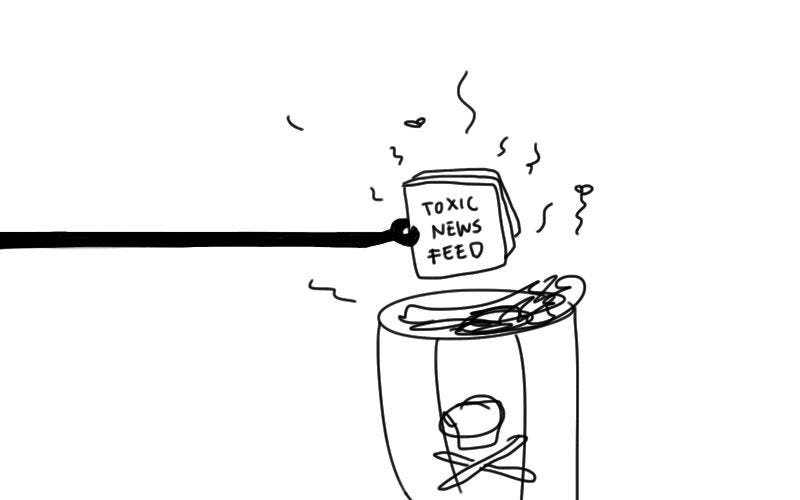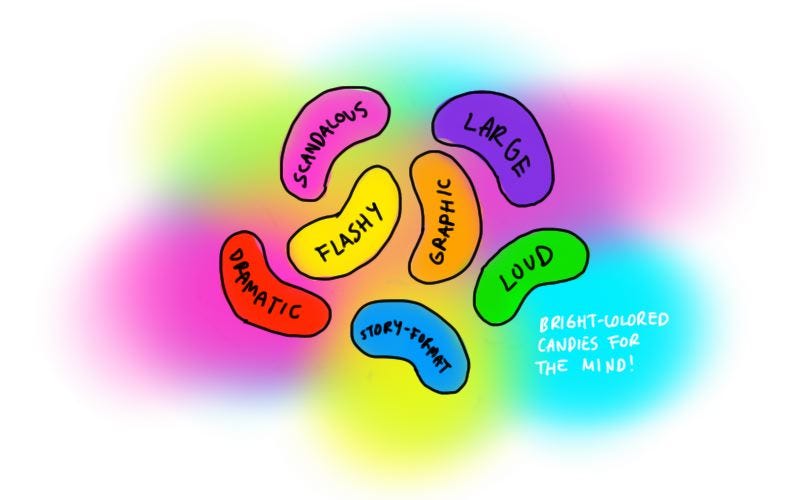I am convinced that reading the news is worse than not reading anything at all. There is no proof that it makes us wiser, better decision makers, better informed, better citizens; nothing — if anything, entirely the opposite.

If you are anything like me, you’ve already stopped consuming news without even making a conscious decision about it. Maybe you felt the optimism being sucked out of you with every news bit and just stayed away or maybe without even noticing it, you found something better to do with your time and started replacing it. Or maybe you’ve never been a news person.
Whatever the reason — I bet you don’t miss it at all and you’ve probably realised you don’t really need it.
“The fortunate among us have recognized the hazards of living with an overabundance of food and have started to shift our diets. But most of us do not yet understand that news is to the mind what sugar is to the body.” -Rolf Dobelli
I wanted to write about this topic for some time now. Largely, because I got frustrated with that guy who thinks he is very cultured just because he reads the newspaper and knows what is going on in the world. And with that girl who knows everything about every celebrity and is very surprised to hear I don’t know about the leaked photos of Jenniffer Lawrence. But mostly, because I’ve benefited from it.
Since I unplugged from the news I feel more in control of my attention (I decide what thoughts I want wandering in my head), I have better reading habits (I seek and enjoy long, slow, thought-provoking reads), I have more time to gain meaningful insights elsewhere, and I’m definitely more optimistic.
So I decided to do some research about it and was blown away to find more than enough reasons to back up my gut instinct. I expected to find arguments on it being irrelevant, misleading, manipulative and time-costly — but toxic for our body? alters our brain structure? creativity killer? increases cognitive errors and inhibits thinking? Now those are significant statements.

And it’s not only the news media, these attention-grabbing techniques are almost everywhere, from government propaganda to corporate marketing. We see it all the time on facebook and twitter, each post screaming to get our attention, not so much asking but really tempting us for a click.
“Information is no longer a scarce commodity. But attention is. Why give it away so easily?” - Rolf Dobelli
In an era of paid-by-the-piece articles, of revenue-generating clicks, where luring headlines are more important than the actual content and where everybody can be a “journalist”, we should be careful about what we consume and we should specially be aware of the negative effects it has on ourselves and our society.
Today we know that the adult brain remains neuroplastic, this means it has the amazing ability to adapt and quite literally change its structure and functions as a result of experiences, environments and behaviours. So it is concerning that we are spending so much time on a daily basis, skimming through pictures, videos, headlines and text for relevant keywords; scrolling, clicking, linking. With so much information, our brain has to form shortcuts to deal with the overload and the distractions, because on top of that, we consume news while multitasking. We read the newspaper while having breakfast, we listen to the news while driving and thinking about our day ahead, we watch news bits on tv while scanning through the channels, we scroll through our twitter timeline during work.
We are quite......
Will come back soon!
我认为看新闻比什么都不看还要糟糕。没有任何证据表明(看新闻)会使我们(变得)更加睿智,会使我们成为更好的决策者,会使我们的消息更加灵通,会使我们成为更好的公民,什么都不可能——如果会的话,那将会是完全相反的情形。
如果你有与我相似的观点,你就早已我停止阅读新闻却不做出决策的行为了。或许你早就感受到了从各种新闻消息中抽身而出的乐趣了,并且你也早就远离了它们。又或许在你根本没有注意到的时候,你已找到更好的消遣从而用掉你的时间,慢慢的,你就遗忘了它们。或许你可能从来就不是一个沉溺于新闻消息的人。
无论什么原因,我打赌你根本不会怀念它们,并且有可能你已经意识到你真的不需要它们。
“幸运的是,我们已经意识到生活在太多‘食物’中的危害,而且早已改变了日常饮食(结构)。但是我们中的大多数人到现在还不理解,新闻之于思想就如糖果之于身体。”Rolf Dobeli这样说道。
我想要写下关于这个主题的(文章)有一段时间了。很大程度上,是因为我觉得很挫败,一个家伙认为自己非常有知识,仅仅是由于他看了报纸,知道这世界正在发生的是什么;同样有一个姑娘知道每个名人的每件事,并非常惊讶于我不了解Jenniffer Lawrence照片泄露的这些事。但大部分的原因是,我已从(新闻消息中走出)中获益。
自我从新闻消息中抽身而出后,我感到我的注意力更受控制了(由我自己决定在我脑海里漫游的想法),我有了更好的阅读习惯(我探索并享受长时间地、慢慢地阅读引人深思的读物),我有了更加充沛的时间在其他地方获得有意义的见识,并且我现在明显更加乐观了。
于是我决定做一些关于它(不再沉溺于新闻消息)的调查研究,接着惊讶地发现已有太多的研究支持我的直觉观念。我期待找到一些观点,证明它是于我们无关紧要的,令我们迷茫,篡改我们的本意并且是对我们身心有毒的;它改变了我们的思考方式;是创造性的杀手;增加感知上的错误并造成惯性思维。现在看看这些有暗示的声明:充斥着丑闻,媚俗,戏剧性,流水线故事,图片轰炸,铺天盖地。
而且不仅仅是新闻媒体,这些想要抓住人注意力的手段,从政府的宣传活动到企业市场,几乎遍及各处。我们随时都能在facebook和twitter看见它,每一条推送都极力想博得我们的关注与其说是请求,不如说是诱惑我们点击进入。
“消息不再是稀缺的资源,但注意力是。为什么要如此轻易地给出去呢?”Rolf Dobeli提出这个疑问。
在每篇文章都需付费阅读的区域,一点击它们就会产生税收,在那里,有吸引力的标题远比实际内容重要得多,并且人人都可以是“新闻记者”;我们应该当心我们消费了什么(新闻);并且我们应该特别注意他们可能附带的,对我们个人及社会的消极影响。
现在我们知道,成年人的大脑仍保持着可塑性,这意味着,它(大脑)有着令人惊讶的适应能力,并且由于人的经验,所处环境,个体行为的变化,大脑也慢慢地改变它的结构和功能。于是,我们(渐渐)花费大把时间在这样的每日都做的事上:浏览图片、阅读头条新闻以及有相关关键词的文章,滚动鼠标,点击链接,连接正文。在这样多的信息环伺之下,我们的大脑不得不开辟几条捷径,以此处理这些超过(大脑)负荷而且又使我们心力分散的事情,因为紧接着我们要处理新闻消息。我们看着报纸吃早餐;听着新闻开车,同时还提前考虑一天的安排;我们快速切换电视频道,看着一条条新闻;在工作时拖动着twitter上的时间轴。
我们快完了......
(它们)很快会回来的。